21+ SAMPLE Nursing Competency Checklist
-
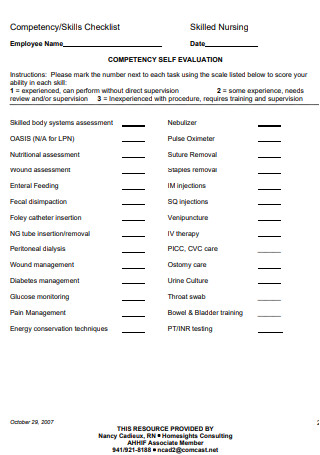
Nurse Competency Checklist in PDF
download now -
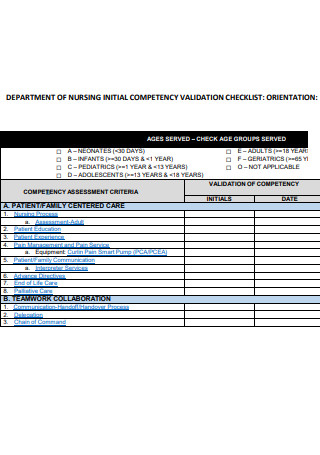
Nursing Initial Competency Orientation Checklist
download now -
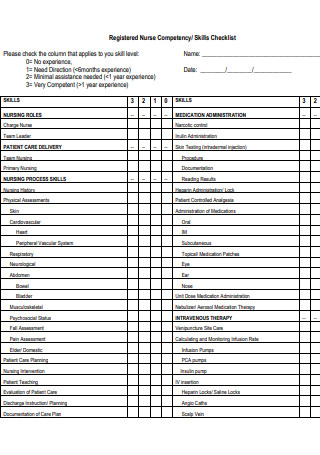
Registered Nurse Competency Checklist
download now -
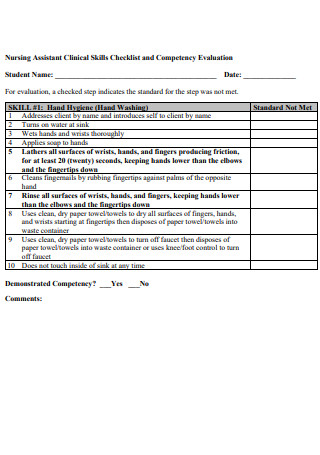
Basic Nurse Competency Checklist
download now -
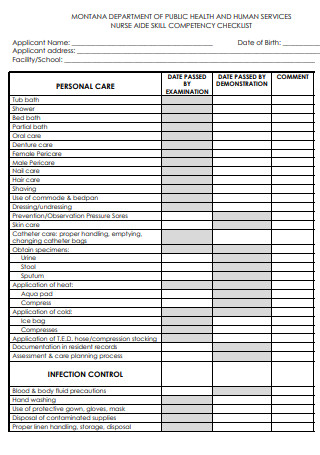
Nurse Skill Competency Checklist
download now -
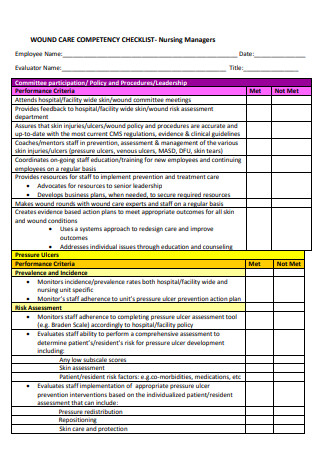
Standard Nurse Competency Checklist
download now -
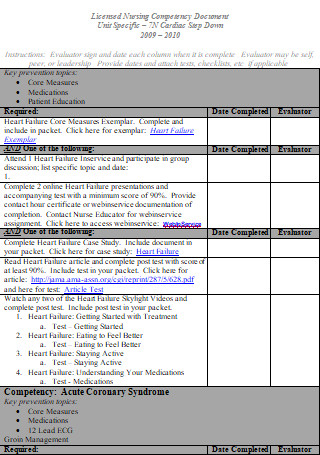
Simple Nurse Competency Checklist
download now -
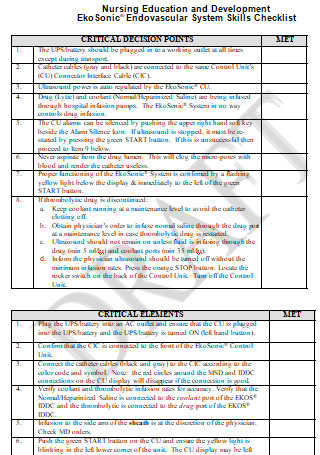
Nurse Competency Checklist
download now -
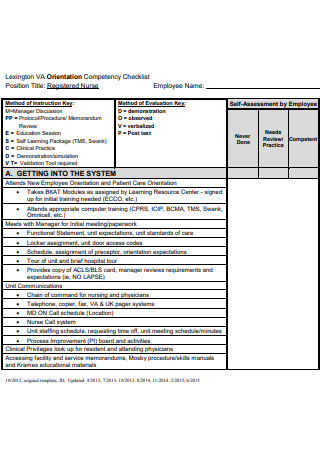
Registered Nurse Orientation Competency Checklist
download now -
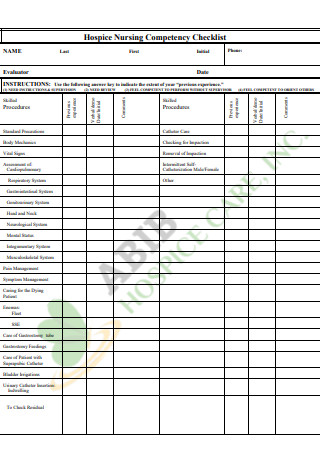
Hospice Nursing Competency Checklist
download now -
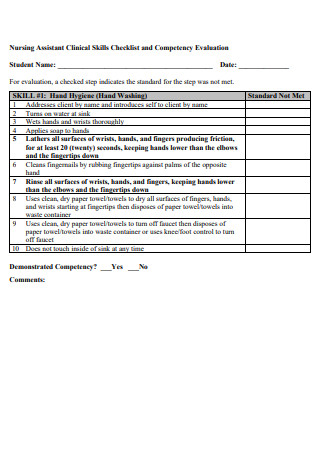
Nursing Assistant Clinical Skills Checklist and Competency Evaluation
download now -
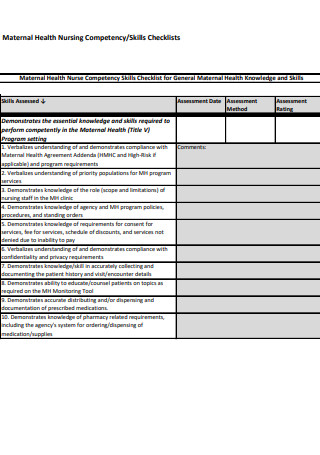
Maternal Health Nursing Competency Checklists
download now -
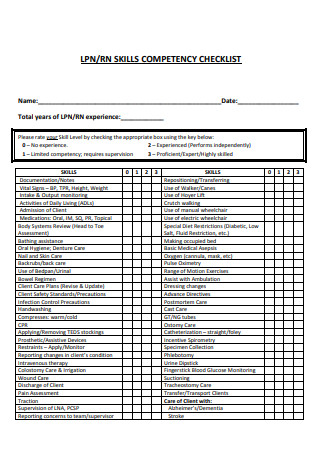
Resigned Nurse Competency Checklists
download now -
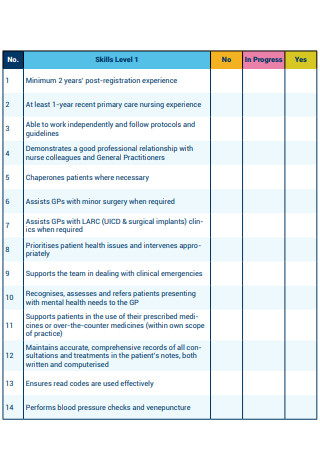
Skills Competency Assessment Checklist for Practice Nurse
download now -
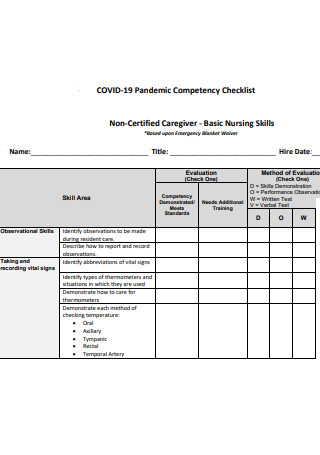
COVID-19 Pandemic Basic Nursing Skills Competency Checklist
download now -
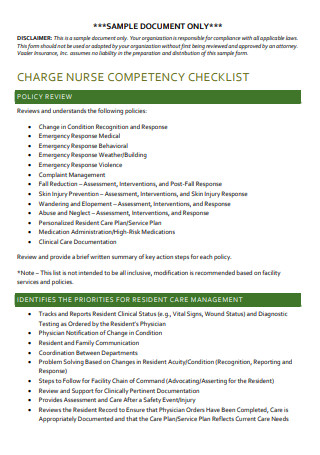
Charge Nurse Competency Checklist
download now -
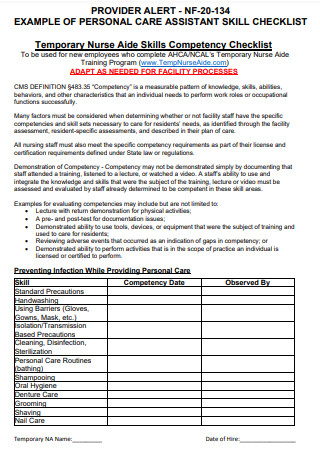
Temporary Nurse Aide Skills Competency Checklist
download now -
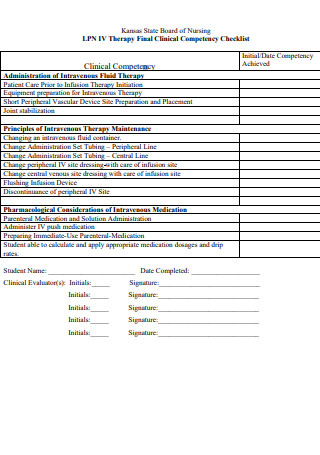
Therapy Final Clinical Competency Checklist of Nursing
download now -
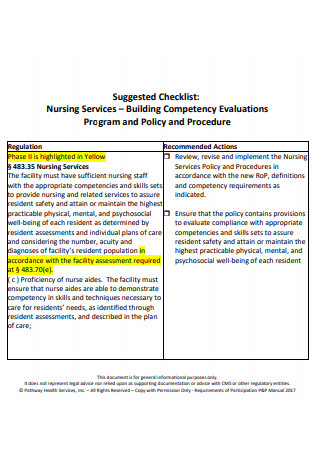
Nursing Services Building Competency Evaluations Program Checklist
download now -
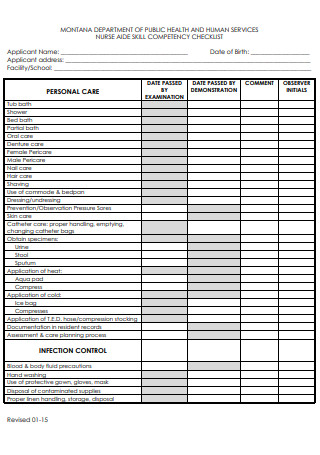
Nurse Aide Skill Competency Checklist
download now -
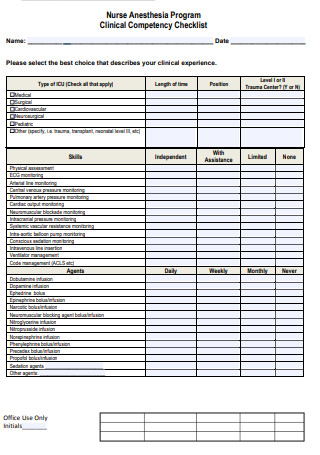
Nurse Anesthesia Program Clinical Competency Checklist
download now -
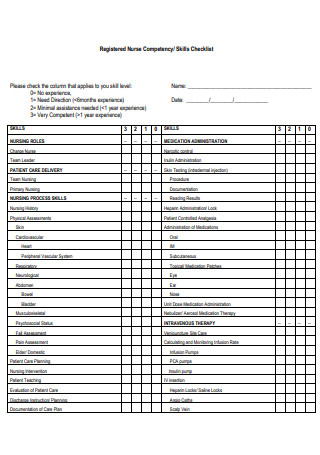
Registered Nurse Competency Skills Checklist
download now
FREE Nursing Competency Checklist s to Download
21+ SAMPLE Nursing Competency Checklist
What Is a Nursing Competency Checklist?
Essential Nursing Skills
How to Draft a Nursing Competency Checklist
FAQs
What Are the Generic Competencies for RCH Nursing?
How does a Nurse Check off a Competency List?
What Are the Core Competencies of a Nurse?
What Is a Nursing Competency Checklist?
Nursing competency refers to the fundamental competencies that are required to carry out one’s responsibilities as a nurse. Consequently, it is critical to creating a precise definition of nursing competency in order to lay the groundwork for the nursing education curriculum. In spite of this, while the concepts surrounding nursing competency are vital for increasing nursing quality, they are still in the early stages of development. The establishment of criteria and structures for nursing competency, as well as the competencies required of nursing practitioners, training techniques, and so on, continue to be difficult tasks to accomplish. In the current study, researchers reviewed the research on the definitions and features of nursing competency in Asia, as well as the structure of nursing competency, its aspects, and evaluation methods. In addition, researchers looked into several training techniques for teaching nursing competency.
Furthermore, The word “nursing competency” refers to the capacity to conduct three primary nursing skills, which include clinical nursing care, ethical reasoning on the part of the nurse, and precise nursing techniques. These are the fundamental abilities that a person must possess in order to qualify as a nurse and provide care for those in need. A nursing competency checklist is created in the form of a “to-do list.” In order to verify that the person undergoing nurse training possesses all of the abilities necessary for nursing, this list should be reviewed often. Nurse Competency Checklist Templates make it easier to create these checklists for nurses. Another associated checklist is the registered nurse competency checklist wherein a nursing competency checklist is created in order to determine whether or not a nurse applicant meets the criteria for all of the needed abilities. You can easily create this checklist if you utilize our checklist sample template, which we have provided below. This template has been created specifically to assist you in the creation of an appropriate nurse competency checklist. This template is available for download in PDF format. A basic nurse competency checklist is a nurse competency checklist is created in order to guarantee that nursing candidates have the necessary skills. The checklist includes the nurse’s contact information as well as his or her qualifications. Do you require assistance in creating this checklist? Then you have arrived at the correct location! With the help of this competency checklist template, you can create an effective working checklist for nursing competency. Additionally, the nurse skill competency checklist is a typical competency checklist for nursing skills that must include the following information: the name and contact information of the nurse being evaluated, the set of skills that must be demonstrated, and the set of skills that the nurse possesses. But why would you go through all of this work when you can simply download a pre-made checklist to your computer and use it instead? Yes, you read it correctly, and all you have to do to obtain the file is to download this professional checklist template from our website. Standard nurse competency checklist, with the help of this standard checklist template, you may download a file containing an example checklist to your computer. This fully editable template includes material created by expert writers, as well as headings that are unique and suggestive in nature. You can use this template as a reference to create one that is specific to your requirements. The template is available for download in two different sizes: A4 and US Letter (letter). Another checklist is a simple nurse competency checklist wherein creating a checklist is mostly intended to make things simpler and easier. Therefore, a nursing competency checklist must be designed in such a way that it is simple to understand and complete out by the person who will be using it. To create this checklist, you can use our easy checklist template, which you can get here. This template is the greatest tool for creating nursing competency checklists because it is easy to customize. This file can also be used to create a medication checklist, which you can find here.
Essential Nursing Skills
Nurses are highly qualified professionals. Their abilities range from technical understanding to interpersonal effectiveness to strategies of self-care and all in between. For anyone interested in learning more about what it takes to be successful in this field, here is the fundamental nursing skills checklist to get you started.
How to Draft a Nursing Competency Checklist
A nursing competency checklist is created in the form of a “to-do list.” In order to verify that the person undergoing nurse training possesses all of the abilities necessary for nursing, this list should be reviewed often. Nurse Competency Checklist Templates make it easier to create these checklists for nurses.
1. Determine the Constituents
Before you can begin creating the competency checklist, you must first identify the parts that will be included in the checklist, as well as the overall structure of the documentation. Nurses’ care, ethical and cultural thought, and nursing skills are the three basic components of the elements of nursing practice. If you want to create a checklist, you must make certain that all three of these elements have been included in the design. Regardless of the nursing unit, the foundation for the checklist follows the same pattern whenever it is implemented. The title, the standard or met initials, and the requisite skills are among the items that must be arranged in the proper order.
2. Nursing Care in the Clinical Setting
The first factor that needs to be mentioned in the checklist is the level of expertise in clinical nursing care that the individual possesses. Clinical nursing care refers to the ability of the nurse to treat and care for patients or people in need in a proper and timely manner. This is one of the most vital talents that a nurse should have, yet it is one of the most difficult to learn. In most cases, the nurse will be expected to present documentation demonstrating his or her nursing care abilities. In addition, the nurse must present documentation of his or her qualifications in the field.
3. Competence in a Multicultural Environment
In medicine, it is an unwritten rule that you cannot treat all patients with the same treatment since it is ineffective. To put it another way, not every individual in need of nursing care should be handled in the same manner. People from a variety of cultural backgrounds may require treatments that are culturally appropriate in certain situations. As a result, it is necessary to assess the nurse’s degree of cultural competency prior to providing care. This level would demonstrate the nurse’s ability to care for patients from a variety of ethnic backgrounds and how well she communicates with them. This is the second item that has to be mentioned in the list of requirements.
4. Diseases and Conditions are Defined as Follows
The primary responsibility of a nurse is to provide care to individuals in need. Patients in hospitals and other healthcare facilities frequently require the assistance of such nurses, who are often called upon by doctors to do so. As a result, the nurse must be knowledgeable about the various diseases and health issues that are associated with his or her field of practice. A nurse who is working at a mental health facility, for example, must be knowledgeable about the psychiatric therapies that may be required by the patients who are admitted to the facility on a regular basis.
5. Information Regarding Drugs
This is analogous to having a working understanding of diseases and disorders. It is necessary for the nurse to be knowledgeable about all of the pharmaceuticals and medications that may be required in his or her sector. Taking the preceding scenario into perspective, if the nurse is employed in a psychiatric facility, he or she would be expected to be familiar with all of the drugs and medications associated with the facility. This ability is necessary because, if the patient does not have an adequate understanding of the medications required, he or she may end up receiving the incorrect medication.
6. Create a Checklist for Yourself
The checklist is created as the final stage in this procedure. When you have determined all of the aspects of the checklist that have been previously mentioned, you can advance to the next stage. The most effective tools for creating this checklist are Microsoft Excel, Google Sheets, and Apple Numbers. Begin by putting the title of the checklist at the top of the page and continuing down the page. Immediately following this, you must include the name of your organization as well as the contact information for the nurse who will be reviewed. Following that, you must include two columns, one of which would provide the required abilities and the other which would have the skills that the nurse possesses.
Remember, you’ll have plenty of time to put all you’ve learned into practice. Everyone understands that you will not have everything you need to be a successful nurse on day one. The most effective strategy for achieving success is to be patient, ask for help when you get stuck and learn as you go along with your fellow students. It’s possible that you’ll discover that you’ve mastered your abilities before you recognize them.
FAQs
What Are the Generic Competencies for RCH Nursing?
In addition to focusing on skills, knowledge, attitudes, beliefs, and abilities that are crucial for all nurses working indirect patient care, the RCH Generic Nursing Competencies also clearly define the standard of practice at the RCH. They are divided into two categories based on the timeframes in which they must be completed: 10 weeks and 12 months, respectively.
How does a Nurse Check off a Competency List?
Completing this competency skills check-off list is the responsibility of nurse management or preceptor. By completing this checklist, the manager or preceptor is certifying that the nurse is competent to practice these nursing tasks on her or his or her own initiative.
What Are the Core Competencies of a Nurse?
Core competencies are a standard set of performance domains and their accompanying behavioral requirements that a nurse is expected to exhibit in order to be licensed. Related Definitions competency: the set of knowledge, abilities, and attitudes that a nurse must possess in order to perform a specific series of activities to an expected level of quality and accuracy.
A nurse competency checklist is an essential tool for anyone who works in a medical setting such as a hospital, clinic, or other sorts of healthcare provider facilities. It is necessary to maintain the list in order to ensure that all of the nurses employed at the facility are competent and have the necessary abilities to care for the patients. The purpose of the list is to keep everything relatable, which is especially important when it comes to nurses. They are similar to the heart of the healthcare provider organizations that must be maintained. When the nurses are incompetent, no one will find it pleasant and satisfying to visit the hospital or that particular clinic on a regular basis. This is why a nurse competency checklist is constantly in demand in this situation.
